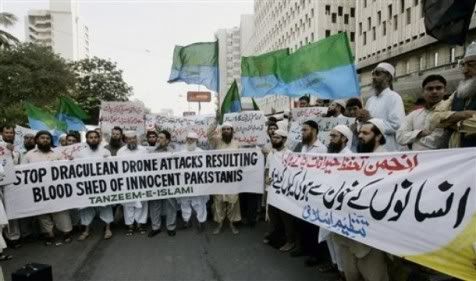The recent visit to Pakistan by the U.S Special Envoy Richard Holbrooke and Admiral Mike Mullen highlighted the growing differences between Pakistan and the United States on how to tackle the threat of Pakistani Taliban. At another level, their visit also signified an emerging consensus between Pakistan’s political leadership and security establishment that it can not afford to give in to the U.S. demands and need to chart a different course.

As a recent Dawn editorial noted, the visiting U.S. team was taken aback by the tone of Pakistani officials. Instead of arm-twisting Pakistan into agreeing to joint military operations in the tribal areas, they were confronted with a barrage of criticism and the visit ended with a rare and public acknowledgment of the differences between the two sides. While the PML-N chief Nawaz Sharif has been forceful in his opposition to these attacks for quite some time, it appears that the Prime Minister Gilani, President Zardari and the COAS Gen. Kiyani has finally thrown their weight behind this argument. Also a recent report from the bipartisan National Security committee condemned such attacks in the “strongest possible manner”.
Ironically its the Americans that deserve most of the “credit” for causing this convergence of thinking in Pakistan. A sustained campaign of charges in the U.S. press against the ISI for its alleged links with militants led by the senior U.S. Generals coupled with the threat of an expansion in drone attacks to cover Baluchistan and settled parts of Pakistan has finally convinced the national leaders to come out against the U.S. plans. Pakistan is also frustrated at the United States for its failure to make Pakistan’s strategic interests in Afghanistan a part of its new strategy for the region.

While it is too early to know if Pakistan can put up enough resistance to stop these attacks by unmanned aircrafts, it is good to see the change in nation’s attitude. Sovereignty is something that you either use or loose and in the case of Pakistan, we have opted for the later for the past 8 years. No one can deny the emerging threat of Taliban emanating from Pakistan’s tribal belt yet no sovereign country can allow such attacks by a foreign power. The western media often cites the killing of high-level Taliban and Al-Qaeda leaders to justify such tactics but they often fail to recognize the impact of such attacks at the strategic level: in addition to the backlash caused by the civilian casualties, these attacks put Pakistan government and army in an impossible situation that they can’t possibly cope with. They have also caused the Taliban to move eastwards into the more settled areas where such attacks are not possible due to population density. A recent report in the Foreign policy magazine summarized the situation as follows:
The US administration justified the drone attacks by claiming it would deny the militants a ‘safe haven’ in Pakistan.‘This line of argument sounds persuasive, but it falls apart on closer examination. For starters, it is not clear that al Qaeda requires a safe haven to do damage, especially since the original organisation has metastasised into smaller groups of sympathisers.’
The magazine pointed out that only a large-scale invasion could eliminate al Qaeda from the region but such an invasion was impossible and therefore there was little reason to continue the drone attacks.
‘US military strikes in Pakistan —even limited ones —tend to undermine the Pakistani government and increase the risk that Pakistan will become a failed state,’ the report noted.



















































The drones are having no impact at all on reducing the militants but are actually strengthening them by giving them more popularity. The anti-Americanism being forstered by the drones is ADDING to the support of the Taliban and other extremists and that is what they are a bad idea, irrespective of all other arguments.
The drones have disrupted the safe havens enjoyed by militants and have caused them considerable losses. That is why the militants are so concerned about them and making so much noise.
I think Pakistanis also recognize this deep down but can’t support the policy due to national pride.
PMA:
Thanks for your note. ‘We the people’ are the center of the problem. Democracy doesn’t work without the engagement of the public and that includes people like me who’ve spent their lives outside Pakistan. Your question has made me think and it may be a while before I really have an answer as to what I might have or could have done differently. For starters, I might have devoted more time, money, and effort to being in Pakistan, to working there, to spending funds there. The things I’ve done have been little-inconsequential things and I wonder what could have been done that might have mattered. I considered living in Pakistan on several occassions — even went looking for work which I found, but later turned down. The money wasn’t enough and I feared professional oblivion.
After Calculating_Misfit
Wasiq: Your anger is spread over many areas. First the Pak Armed Forces:
“Pakistan has an ineffectual-bloated military establishment that would be unaffordable without foreign